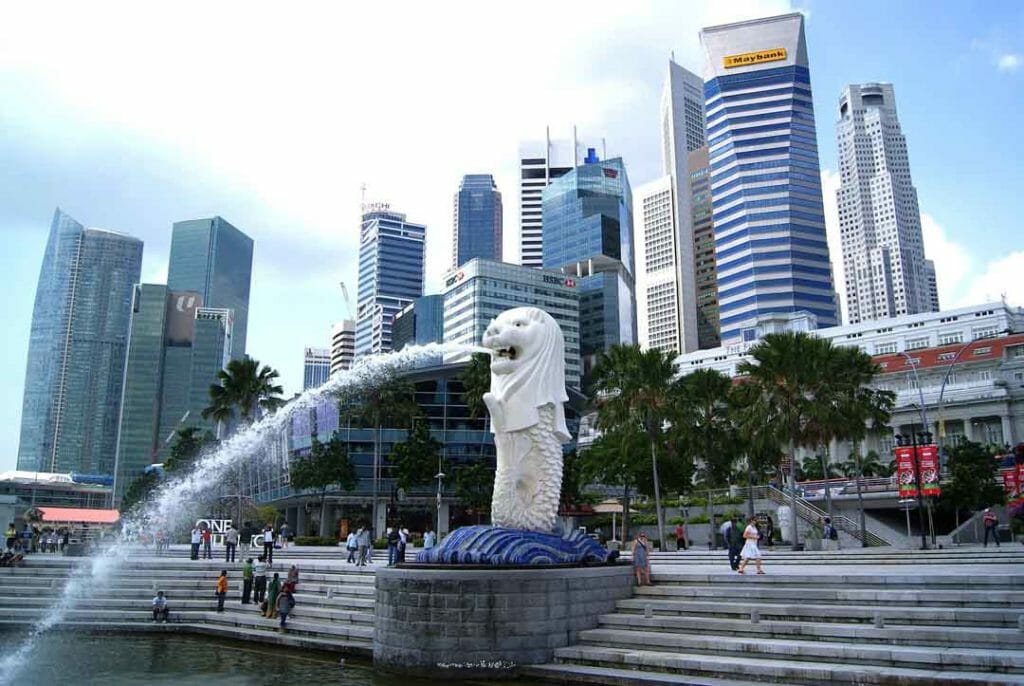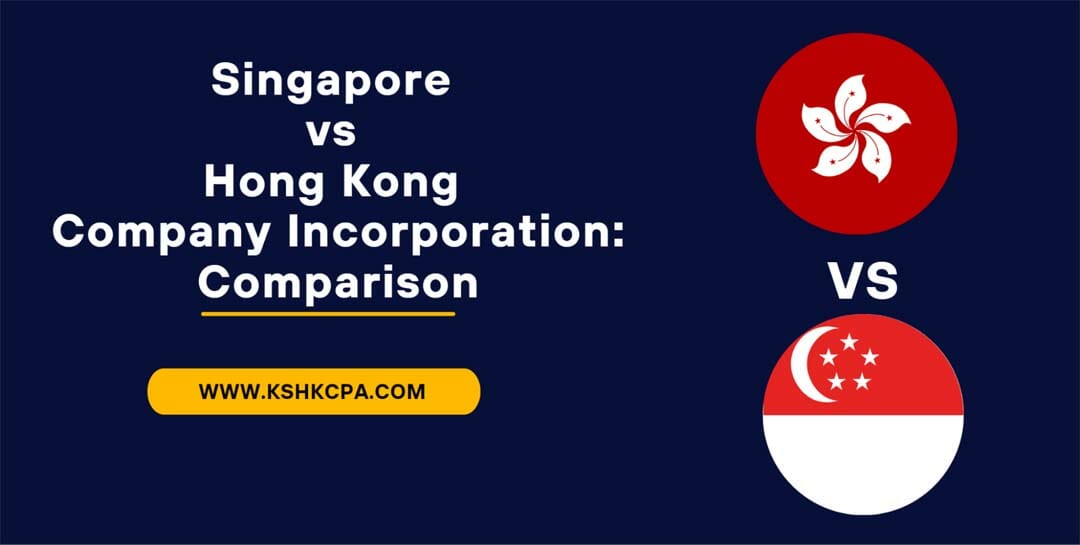Global entrepreneurs are attracted to both Singapore and Hong Kong when it comes to setting up and operating a business since they both rank in the top 3 in the World Bank’s Ease of Doing Business Index.
Both have a lot in common but some differences will draw investors to one over the other depending on which one is better suited to meet their personal preferences and industry’s needs.
With Hong Kong located between mainland China and the South China Sea and Singapore, a tiny island, located just off the southern tip of the Malay Peninsula, they are both strong contenders in South East Asia with their pro-business policies, world-class banking, low tax rates, and easy company incorporation process.
Foreign investment has had a tremendous impact on both jurisdictions.
Let’s break some of these categories down even further for the prospective business owner which will make the differences between Singapore vs Hong Kong company incorporation more apparent.
Table of Contents
Differences Between Singapore and Hong Kong Company Incorporation

When it comes to company incorporation, there are 3 important factors to consider. These include the incorporation requirements, banking procedures, taxation policies, and compliance requirements.
Let’s first take a look at the incorporation requirements.
Incorporation Requirements
We will compare the incorporation requirements of a private limited company in Singapore to a limited company in Hong Kong.
Directors
There must be a minimum of one director but there can be an unlimited maximum number of directors in both jurisdictions. Directors must be at least 18 years of age.
In Singapore, there must be at least one director who is a resident of Singapore while the director in a Hong Kong entity can be a non-resident. One corporate director is mandatory in Hong Kong.
Company Secretary
Singapore requires the company secretary to be a Singapore citizen, Singapore resident, or employment pass holder.
Hong Kong’s company secretary can be an individual or corporate entity. If it’s an individual, the secretary must reside in Hong Kong.
If it is a body corporate, it must have a registered office in Hong Kong or a place of business in Hong Kong.
Shareholders
Both Hong Kong and Singapore must have a minimum of 1 shareholder and the maximum is 50. These shareholders can be either local or foreign and either individuals or corporate entities.
Shareholders must be at least 18 years of age and a director or shareholder can be the same or a different person.
Share Capital
The minimum issued capital for Singapore companies must be at least S$1 or Singapore dollar and there is no minimum share capital required in Hong Kong.
Registered Office Address
A Singapore company must have a registered office address in Singapore that is not a P.O. Box. Hong Kong’s registered office must be located in Hong Kong and it cannot be a P.O. Box either.
Capital
The required paid-up capital in Singapore is S$1. The minimum share capital in Hong Kong is HK$1 and the authorized capital is HK$10,000
Tax Residency
The control of and the management of the company must be done from Singapore to be eligible for tax residency. In Hong Kong, there is no definition for tax residency.
Company Name
The company name is approved by the Accounting and Regulatory Authority in Singapore while in Hong Kong the name is approved by the Companies Registry.
Actual Procedure
In Singapore, the company name must be approved and the business operation must be registered.
With Hong Kong’s procedures, you must choose a company name, complete the company incorporation process, register the business, and receive applicable certificates.
Time to Incorporate
In both Hong Kong and Singapore, it only takes a few hours for incorporation to occur if all of the paperwork is in order.
Government Fees
The Singapore government charges a name approval fee and a company registration fee when incorporating a company.
Hong Kong has a fee payable with the application and there is also a company registration fee and levy.
There are no significant differences in the incorporation process between the two jurisdictions.

Differences Between Singapore and Hong Kong Banking
Banking is another aspect to consider when trying to decide whether to incorporate it in Singapore or Hong Kong.
In both locales, you can open a corporate bank account and start running the business after you have registered the company.
Both Singapore and Hong Kong have world-class international banking systems.
The high banking fees and minimums vary by each bank but overall, average about the same.
Hong Kong’s bank account opening procedures for non-locals are a little more involved than it is in Singapore.
Hong Kong requires that you have an in-person meeting with the bank when opening an account while Singapore is open to meeting through video conference.
Creating bank accounts usually takes around two weeks in both jurisdictions.

Differences Between Singapore and Hong Kong Taxation Policies
Tax implications are another strong consideration in deciding where to incorporate the two. This may be the most influential factor when trying to decide.
Lesser payable taxes is usually the deal-breaker when trying to decide where to incorporate your business.
You can begin to see the difference between the two jurisdictions when it comes to their taxation policies.
Tax System
Hong Kong has a territorial tax system while Singapore has a territorial tax system in addition to tax on certain types of foreign source income that is subject to tax upon remittance.
Tax Exchange
Singapore does allow an exchange of tax information with a foreign country as long as the request is reasonable and specific.
Hong Kong also allows the exchange of tax information and no court order is required.
Foreign Exchange Controls
There is no control over foreign exchange among a foreign country in either jurisdiction.
Double Tax Treaties
Singapore has around 88 double tax treaties while Hong Kong has around 44 of these cross-border tax treaties.
Corporate Tax Rate
Singapore’s corporate tax rate is anywhere up to 17%. If Singapore resident companies take advantage of various tax exemptions and incentives, then the effective rate is a lot less.
For example, there is a 75% tax exemption on the first S$100,000 of taxable income and an additional 50% exemption on the next S$100,000 of taxable income.
In Hong Kong, there is an 8.25% tax rate on any assessable profits that range up to HK$2 million and 16.5% on any assessable profits over HK$2 million.
Goods & Services Tax
Singapore charges a 7% tax on goods and services. There is no tax on goods and services in Hong Kong.
Capital Gains Tax
Neither Singapore nor Hong Kong tax capital gains.
Withholding Taxes
There are no withholding tax rates on dividend distributions in either jurisdiction.
In Singapore, the withholding tax rates entail a 10% withholding tax on gross interest paid to non-residents who do not have any business operations in Singapore.
In Hong Kong, there is no tax on interest.
When it comes to gross royalty, there is a 10% withholding tax on gross royalty paid to non-residents who do not have any business operations in Singapore.
In Hong Kong, the withholding tax is 16.5% on either 30% or 100% depending on qualifying conditions.
Double Taxation Agreement
Taxpayers in Singapore can avoid double taxation by taking advantage of the Foreign Tax Credit with pooling allowed.
Hong Kong can avoid double taxation with the ordinary credit method with no pooling allowed.
Tax Incentives
Hong Kong does not have any tax incentives. Singapore has quite a few tax incentives.
These include Foreign Tax Credit Pooling, Productivity & Innovation Credit, Corporate Tax Rebate, Global Trader Programme, Start-up Tax Exemption Scheme, Partial Exemption Scheme, Fund Management activities with a 5% or 10% corporate tax rate, and Operational Headquarters with a 5% or 15% corporate income tax rate.
Foreign-Sourced Income Tax
In Hong Kong, there is no tax on foreign-sourced income. In Singapore, technically Singapore resident companies are taxed on foreign-sourced income, however, the Foreign Tax Credit Scheme and tax treaties counterbalance the foreign income.
Register of Controllers
In most cases, controllers are individuals who hold over 25% of issued shares in the company. Singapore requires companies to maintain a register of controllers.
This is a private document that periodically gets submitted to the non-public register of company controllers.
Every company incorporated in Hong Kong must maintain an internal significant controller register.
Outside of the corporate arena, both Singapore and Hong Kong have relatively low personal income tax rates as well.

Differences Between Singapore and Hong Kong Annual Compliance Requirements
Annual compliance requirements are another factor to weigh in on when deciding between Singapore and Hong Kong for business incorporation.
There are not many differences when it comes to annual compliance requirements for Singapore and Hong Kong companies.
Annual General Meetings
Both jurisdictions require that general meetings take place annually with their shareholders.
The only time an annual general meeting is not required is if they have passed a shareholders’ resolution.
In both locations, the first annual general meeting has to take place within 18 months of the incorporation date.
Then annual general meetings have to be held every calendar year within 15 months of each other.
The main purpose of the annual general meetings is to go over the company’s financial statements.
Financial Statements
Reporting Standards
Financial statements in Singapore must be reported annually at the annual general meeting by the Singapore Financial Reporting Standards.
The financial statements in Hong Kong must be approved annually at the annual general meeting.
All financial transactions are entered into accounting records following the Hong Kong Financial Reporting Standards.
Audit
In Singapore, financial statements should be audited. Eligible small and dormant companies can prepare unaudited financial statements.
In Hong Kong, the financial statements must be audited by CPAs.
Required Financial Statements
In Singapore, the required financial statements include a report of directors, auditor’s report, statement of shareholder’s equity, statement of financial position, statement of comprehensive income, cash flow statement, and corresponding notes to the financial statements.
In Hong Kong, financial statements include an auditor’s report, report of directors, statement of financial position, statement of comprehensive income, cash flow statement, and statement of changes in equity.
Filing of Annual Return With Companies Registry
Both jurisdictions also require the filing of an annual return.
Information Required
The information required to file an annual return with the Companies Registry is the same in the two jurisdictions.
Basic details of the company include company name, registration number, registered office address, share capital, principal activities, details of company officers, shareholder details, and annual financial statements.
Filing of Annual Tax Return
Tax Filing
In Singapore, you must file an annual tax return with the Inland Revenue Authority of Singapore that includes your income, profits & losses, deductions, and details about a tax refund, or tax liability.
Hong Kong requires the filing of a Profits Tax Return with the Inland Revenue Department. The information is the same as Singapore’s tax filing.
Filing Date
In Singapore, the Estimated Chargeable Income must be filed within 3 months of the company’s financial year-end.
The corporate income tax return must be filed by November 30 if it is a paper filing or by December 15 if filed electronically.
In Hong Kong, for newly formed companies, the Profits Tax Return must be filed within 18 months from the incorporation date and then every 12 months thereafter.
There are not many differences when it comes to annual compliance requirements for Singapore and Hong Kong companies.
The incorporation requirements, banking, and annual compliance requirements vary slightly between Singapore and Hong Kong but there are no extreme differences.
The major differences show up in their taxation policies.
The differences in their taxation policies lie in their number of double tax treaties, goods & services tax, and foreign-sourced income.
Singapore has twice as many double tax treaties as Hong Kong. Singapore also enforces a goods and services tax where Hong Kong does not have one.
Finally, technically, Singapore taxes foreign-sourced income whereas Hong Kong does not tax income from foreign sources.
In the Singapore vs Hong Kong company incorporation debate, which would you choose?
The answer is going to boil down to your company’s needs and your personal preferences.
FAQ
Why do foreign investors consider Singapore vs Hong Kong when trying to decide where to incorporate their business operation?
Both Singapore and Hong Kong are considered the future of trading centers and international banking in Asia.
Who holds the top place in the World Bank’s Ease of Doing Business Category?
Both Singapore and Hong Kong rank in the top 3 spots in the World Bank’s Ease of Doing Business Category.
How are the regions of Singapore vs Hong Kong classified?
Hong Kong is a special administrative region of China and Singapore is an independent state.
What drives the economy in Singapore and Hong Kong?
Singapore and Hong Kong are both two of the busiest port cities and top financial centers in the world which is a great boost to their economy.
Is Singapore or Hong Kong a better region to incorporate a business?
The answer will depend on the needs of your company and your personal preferences.

